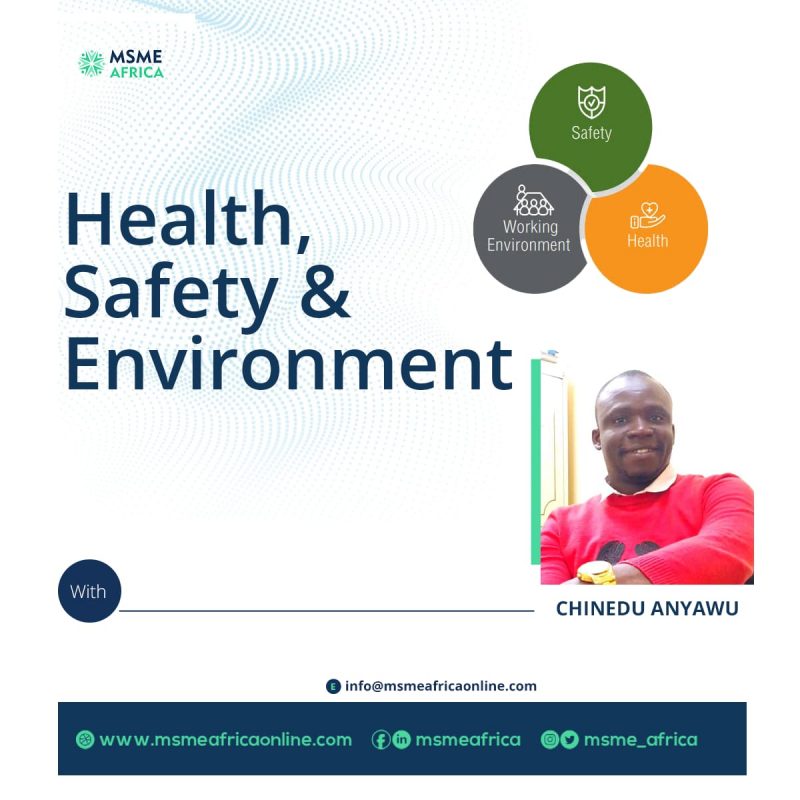Every Business has a key objective to make profits and to achieve this businesses must consider avoiding any form of loss.
Unfortunately, while considering areas of losses, many small and medium businesses have not considered Health, Safety, and Environmental Issues and have continued to suffer losses due to this.
The International Labour Organization (ILO) estimated that there of 340 million occupational accidents and 160 million victims of work-related illnesses worldwide.
Accidents cost money. The cost of an accident can be both direct and indirect. A direct cost can be in the form of medical bills, Equipment repairs, etc. The indirect cost is even more, from the cost of litigations to downtime, and reputation damage. Considering these costs, it becomes necessary for businesses to implement Health, Safety, and Environmental practices in their operation.
Implementing Health, Safety, and Environmental (HSE) practices is crucial for small and medium businesses (SMBs) to ensure the well-being of their employees, customers, and the environment.
Here are some important considerations for integrating HSE into your business:
Risk Assessment and Management: Identify potential hazards and risks within your workplace, operations, and products/services.
Evaluate the likelihood and severity of these risks and prioritize them for mitigation.
Develop strategies to minimize or eliminate risks, such as using proper equipment, implementing safety protocols, and training employees.
Workplace Safety: Provide proper training to employees on how to operate equipment, handle chemicals, and respond to emergencies.
Maintain a clean and organized workspace to prevent accidents and injuries.
Ensure that safety equipment, such as personal protective equipment (PPE), fire extinguishers, and first aid kits, are readily available and in good condition.
Employee Health and Well-being: Establish health and wellness programs to promote physical and mental well-being among employees.
Encourage work-life balance and address issues related to stress and burnout.
Provide access to medical facilities or resources and promote regular health check-ups.
Emergency Preparedness: Develop and communicate emergency response plans for various scenarios (e.g., fire, natural disasters, chemical spills) depending on your business type.
Conduct regular drills to ensure that employees are familiar with the emergency procedures.
Hazardous Material Management: Properly store, label, and handle hazardous materials to prevent leaks, spills, and exposures.
Provide employees with training on handling hazardous materials safely.
Waste Management: Implement proper waste disposal practices, including recycling and proper disposal of hazardous waste. Comply with local regulations regarding waste management and disposal.
Environmental Impact: Consider the environmental impact of your business operations, products, and services. Look for ways to minimize energy consumption, reduce waste, and adopt eco-friendly practices.
Compliance with Regulations: Stay informed about relevant health, safety, and environmental regulations applicable to your industry and location. Ensure that your business operations are in compliance with these regulations.
Training and Education: Provide ongoing training to employees about safety protocols, environmental practices, and relevant regulations. Foster a culture of safety and environmental responsibility through education and awareness.
Regular Audits and Reviews: Conduct regular audits of your HSE practices to identify areas for improvement. Review and update your HSE policies and procedures to reflect changes in your business and regulations.
Community Engagement: Engage with your local community to address concerns and build positive relationships. Participate in local environmental initiatives or projects.
Businesses that make Health, Safety, and Environmental considerations are happier and more successful because HSE considerations are not only important for the well-being of your employees and the environment, but they can also contribute to the overall success and reputation of your business. Prioritizing HSE can lead to increased employee satisfaction, reduced costs due to accidents and fines, and improved public perception of your business.









